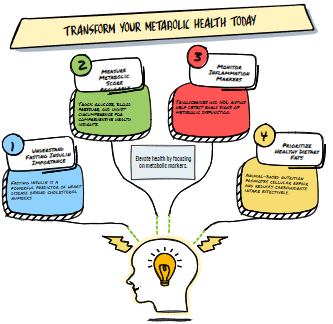
This Blood Test Predicts Heart Attacks Better Than Cholesterol
This Blood Test Predicts Heart Attacks Better Than Cholesterol
While your doctor obsesses over your cholesterol numbers, a metabolic disaster is brewing silently in 93% of Americans. After three decades in clinical practice, we've witnessed a disturbing pattern: physicians focusing on cholesterol panels while ignoring powerful predictors of heart disease.
The truth? Fasting insulin predicts heart attacks 6.7 times better than cholesterol ever could.
Yet most physicians never order this simple $30 test.
The Metabolic Health Crisis Nobody's Talking About
Metabolic dysfunction—not high cholesterol—drives our epidemic of chronic disease. Heart disease, diabetes, Alzheimer's, and even many cancers share a common root: insulin resistance.
The medical system profits from keeping you sick with medications that mask symptoms rather than addressing causes. The average physician receives just 2.5 hours of nutrition training throughout medical school. They're taught to prescribe statins rather than address the dietary factors destroying metabolic health.
This isn't conspiracy. It's economics.
Three Critical Numbers That Matter More Than LDL
Forget obsessing over LDL cholesterol. These markers tell a more complete story about your cardiovascular risk:
1. Your Metabolic Score
Fasting blood glucose should range between 70-100 mg/dL. Blood pressure should remain under 120/80. And waist circumference—a simple but powerful indicator of visceral fat—should measure less than 40 inches for men and 35 inches for women.
These three measurements alone provide more insight into your health trajectory than any cholesterol panel.
2. Hidden Inflammation Markers
Triglycerides should stay below 150 mg/dL while HDL should exceed 40 mg/dL for men and 50 mg/dL for women. The ratio between these two numbers often reveals metabolic dysfunction before other tests.
Most critically, fasting insulin should remain under 10 μIU/mL. Elevated insulin drives arterial inflammation years before glucose levels become abnormal.
3. Real Risk Factors
Blood pressure impacts cardiovascular risk twice as much as LDL. Excess abdominal fat indicates organ damage and systemic inflammation. And insulin resistance predicts heart disease better than any other single marker.
Yet conventional medicine remains fixated on cholesterol.
Low-Carb Approaches Target Root Causes
We've observed remarkable transformations when patients adopt ketogenic or carnivore diets. These approaches directly address the underlying metabolic dysfunction conventional medicine ignores.
Ultra-processed foods, industrial seed oils, and excessive carbohydrates drive insulin resistance. By eliminating these modern dietary toxins, we see rapid improvements in metabolic markers.
The science is straightforward: lower carbohydrate intake reduces insulin production. When insulin levels fall, inflammation subsides. The body begins to heal.
Robert, a 62-year-old patient with decades of metabolic syndrome, eliminated 15 medications within six months after adopting a carnivore approach. His fasting insulin dropped from 26 to 8, and his triglycerides fell from 320 to 72. His cardiologist was stunned.
The Metabolic Health Solution
Animal-based nutrition provides the nutrients needed for cellular repair while naturally restricting carbohydrates. This dietary pattern:
• Rapidly reduces fasting insulin
• Improves triglyceride-to-HDL ratio
• Decreases inflammatory markers
• Normalizes blood pressure without medication
• Reduces visceral fat accumulation
Unlike conventional approaches that treat symptoms, addressing the root causes through proper nutrition creates sustainable health improvements.
Take Control of Your Metabolic Health
The medical establishment resists this paradigm shift because it threatens the prescription-centered model of care. We must become our own advocates.
Request fasting insulin testing at your next appointment. Track your triglyceride-to-HDL ratio. Measure your waist circumference regularly.
Consider eliminating the dietary toxins driving metabolic dysfunction: processed foods, vegetable oils, and excess carbohydrates. Replace them with nutrient-dense animal proteins and fats that support cellular health.
Your metabolic health determines your future far more than your cholesterol numbers. Don't wait for conventional medicine to catch up to what the research clearly shows.
The metabolic health revolution begins with understanding these markers and taking action to optimize them. Your life may depend on it.
